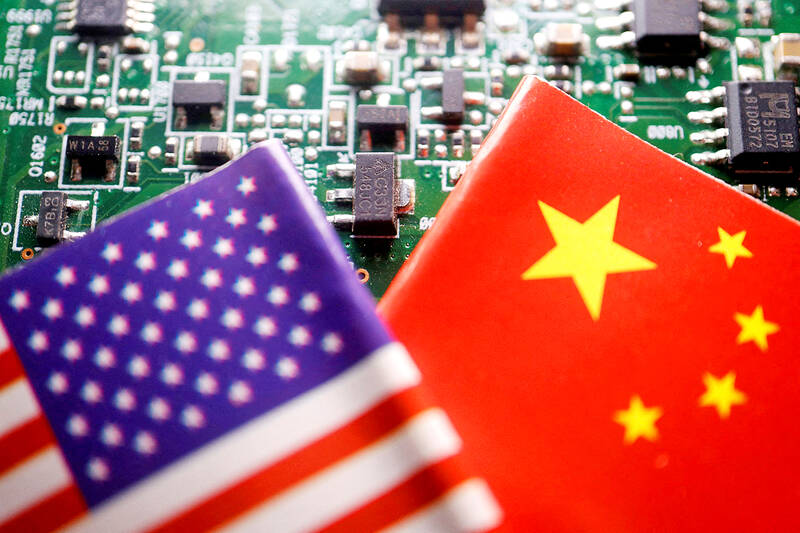The US Department of Commerce on Friday issued its final rules to prevent semiconductor manufacturing subsidies from being used by China and other countries deemed to pose US national security concerns.
The regulations are the final hurdle before the administration of US President Joe Biden can begin awarding US$39 billion in subsidies for semiconductor production. The landmark Creating Helpful Incentives to Produce Semiconductors (CHIPS) and Science Act provides US$52.7 billion for US semiconductor production, research and workforce development.
First proposed in March, the regulations set “guardrails” by limiting recipients of US funding from investing in expanding chip manufacturing in countries of concern such as China and Russia, and limit recipients of incentive funds from engaging in joint research or technology licensing efforts with foreign entities of concern.

Photo: Reuters
In October last year, the department issued new export controls to cut China off from certain semiconductor chips made with US equipment in its bid to slow Beijing’s technological and military advances.
“We have to be absolutely vigilant that not a penny of this helps China to get ahead of us,” US Secretary of Commerce Gina Raimondo told the US Congress on Tuesday.
If funding recipients contravene restrictions, the department can claw back federal awards.
Raimondo told Congress that she is working as fast as possible to get awards approved.
“I feel the pressure,” Raimondo said. “We are behind, but it is more important that we get it right.”
The regulations prohibit funding recipients from significantly expanding semiconductor manufacturing capacity in foreign countries of concern for 10 years. They also restrict recipients from some joint research or technology licensing efforts with foreign entities of concern, but allow for international standards, patent licensing, and utilizing foundry and packaging services.
The rules prohibit material expansion of semiconductor manufacturing capacity for leading-edge and advanced facilities in foreign countries of concern for 10 years.
They also clarify that wafer production is included within semiconductor manufacturing.
The final rule ties expanded semiconductor manufacturing capacity to adding clean-room or other physical space, defining material expansions as increasing production capacity by more than 5 percent.
The rule prohibits recipients from adding new clean-room space or production lines that result in expanding a facility’s production capacity beyond 10 percent.
It also classifies some semiconductors as critical to national security, triggering tighter restrictions, including quantum computing current-generation and mature-node chips, in radiation-intensive environments and for other specialized military capabilities.

EXPRESSING GRATITUDE: Without its Taiwanese partners which are ‘working around the clock,’ Nvidia could not meet AI demand, CEO Jensen Huang said Taiwan Semiconductor Manufacturing Co (TSMC, 台積電) and US-based artificial intelligence (AI) chip designer Nvidia Corp have partnered with each other on silicon photonics development, Nvidia founder and CEO Jensen Huang (黃仁勳) said. Speaking with reporters after he met with TSMC chairman C.C. Wei (魏哲家) in Taipei on Friday, Huang said his company was working with the world’s largest contract chipmaker on silicon photonics, but admitted it was unlikely for the cooperation to yield results any time soon, and both sides would need several years to achieve concrete outcomes. To have a stake in the silicon photonics supply chain, TSMC and

‘DETERRENT’: US national security adviser-designate Mike Waltz said that he wants to speed up deliveries of weapons purchased by Taiwan to deter threats from China US president-elect Donald Trump’s nominee for US secretary of defense, Pete Hegseth, affirmed his commitment to peace in the Taiwan Strait during his confirmation hearing in Washington on Tuesday. Hegseth called China “the most comprehensive and serious challenge to US national security” and said that he would aim to limit Beijing’s expansion in the Indo-Pacific region, Voice of America reported. He would also adhere to long-standing policies to prevent miscalculations, Hegseth added. The US Senate Armed Services Committee hearing was the first for a nominee of Trump’s incoming Cabinet, and questions mostly focused on whether he was fit for the

IDENTITY: Compared with other platforms, TikTok’s algorithm pushes a ‘disproportionately high ratio’ of pro-China content, a study has found Young Taiwanese are increasingly consuming Chinese content on TikTok, which is changing their views on identity and making them less resistant toward China, researchers and politicians were cited as saying by foreign media. Asked to suggest the best survival strategy for a small country facing a powerful neighbor, students at National Chia-Yi Girls’ Senior High School said “Taiwan must do everything to avoid provoking China into attacking it,” the Financial Times wrote on Friday. Young Taiwanese between the ages of 20 and 24 in the past were the group who most strongly espoused a Taiwanese identity, but that is no longer

A magnitude 6.4 earthquake and several aftershocks battered southern Taiwan early this morning, causing houses and roads to collapse and leaving dozens injured and 50 people isolated in their village. A total of 26 people were reported injured and sent to hospitals due to the earthquake as of late this morning, according to the latest Ministry of Health and Welfare figures. In Sising Village (西興) of Chiayi County's Dapu Township (大埔), the location of the quake's epicenter, severe damage was seen and roads entering the village were blocked, isolating about 50 villagers. Another eight people who were originally trapped inside buildings in Tainan